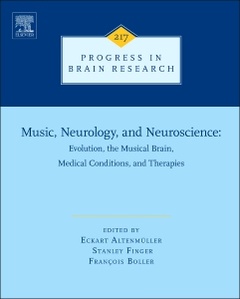Music, Neurology, and Neuroscience: Evolution, the Musical Brain, Medical Conditions, and Therapies
Directeurs de Collection : Altenmüller Eckart, Finger Stanley, Boller Francois

Did you ever ask whether music makes people smart, why a Parkinson patient's gait is improved with marching tunes, and whether Robert Schumann was suffering from schizophrenia or Alzheimer's disease? This broad but comprehensive book deals with history and new discoveries about music and the brain. It provides a multi-disciplinary overview on music processing, its effects on brain plasticity, and the healing power of music in neurological and psychiatric disorders. In this context, the disorders the plagued famous musicians and how they affected both performance and composition are critically discussed, and music as medicine, as well as music as a potential health hazard are examined. Among the other topics covered are: how music fit into early conceptions of localization of function in the brain, the cultural roots of music in evolution, and the important roles played by music in societies and educational systems.
- Darwin and Spencer on the Origin of Music: Is Music the Food of Love?
- Music Evolution and Neuroscience
- Musicians and Music Making as a Model for the Study of Brain Plasticity
- Expert Music Performance: Cognitive, Neural, and Developmental Bases
- Apollo’s Curse – Neurological Causes of Motor Impairments in Musicians
- Music and Its Association with Epileptic Disorders
- Treatment and Prevention of Music Performance Anxiety
- Music as Therapy in Early History
- An Enlightenment Proposal for Music Therapy: Richard Brocklesby on Music, Spirit and the Passions
- Neurological Implications and Neuropsychological Considerations on Folk Music and Dance
- Music and Dementia
- Apollo’s Gift: New Aspects of Neurologic Music Therapy
- The Discovery of Human Auditory-Motor Entrainment and Its Role in the Development of Neurologic Music Therapy Michael H. Thaut
Kim Kleinman
Charles T. Snowdon
Gottfried Schlaug
Robert J. Zatorre
Eckart Altenmüller
Melissa Maguire
Claudia Spahn
Michael H. Thaut
Penelope Gouk
Michele Augusto Riva
Séverine Samson
Gottfried Schlaug
François Boller, M.D., Ph.D. has been co-Series Editor of the Handbook of Clinical Neurology since 2002. He.is a board-certified neurologist currently Professor of Neurology at the George Washington University Medical School (GW) in Washington, DC. He was born in Switzerland and educated in Italy where he obtained a Medical Degree at the University of Pisa. After specializing in Neurology at the University of Milan, Dr. Boller spent several years at the Boston VA and Boston University Medical School, including a fellowship under the direction of Dr. Norman Geschwind. He obtained a Ph.D. in Experimental Psychology from Case Western Reserve University in Cleveland, Ohio where he was in charge of Neuroscience teaching at the Medical School and was nominated Teacher of the Year. In 1983, Dr. Boller became Professor of Neurology and Psychiatry at the University of Pittsburgh where he founded and directed one of the first NIH funded Alzheimer Disease Research Centers in the country. In 1989, he was put in charge of a Paris-based INSERM Unit dedicated to the neuropsychology and neurobiology of cerebral aging. He returned to the United States and joined the NIH in 2005, before coming to GW in July 2014.
Dr. Boller’s initial area of interest was aphasia and related disorders; he later became primarily interested in cognitive disorders and dementia with emphasis on the correlates of cognitive disorders with pathology, neurophysiology and imaging. He was one of the first to study the relation between Parkinson and Alzheimer disease, two processes that were thought to be unrelated. His current area of interest is Alzheimer’s disease and related disorders with emphasis on the early and late stages of the disease. He is also interested in the history of Neurosciences and is Past President of the International Society for the History of Neurosciences. He was the founding Editor-in-Chief of the European Journal of Neurology, the official Journal of the European Federation
- Topic: Music is interesting to almost everybody
- Orientation: This book looks at music and the brain both historically and in the light of the latest research findings
- Comprehensiveness: This is the largest and most comprehensive volume on "music and neurology" ever written!
- Quality of authors: This volume is written by a unique group of real world experts representing a variety of fields, ranging from history of science and medicine to neurology and musicology
Date de parution : 02-2015
Ouvrage de 292 p.
19x23.3 cm
Thèmes de Music, Neurology, and Neuroscience: Evolution, the... :
Mots-clés :
Music; Musicians; Neurological Disorders; Modern Music Therapies; Neurology



